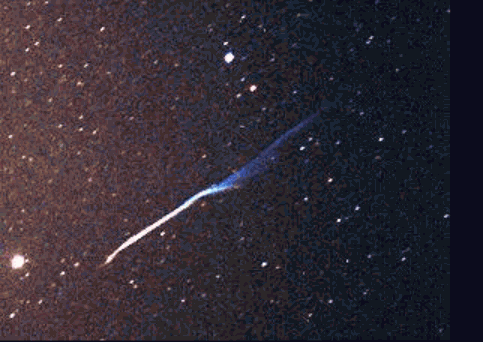Explanation: This dramatic four-frame animation shows a fireball meteor and its developing persistent "smoke" train, recorded two weeks ago in skies near Salvador, Brazil. Indeed similar sights are astonishingly familiar world-wide to witnesses of this November's fireball-rich Leonid meteor storm. A few skygazers even discovered that some bright Leonid fireballs made faint, gentle, hissing sounds(!), a surprising effect only recently appreciated and understood. Accounts of fireball meteors making noise have long been viewed with skepticism, particularly because sounds were reportedly heard just as the meteor was seen overhead. But light travels much faster than sound so, like delayed thunder from a distant lightning stroke, a meteor produced sound should only be heard long after the meteor streak was seen. A sound explanation supported by laboratory tests is that turbulent plasma created by the meteor's passage generates very low frequency radio waves. Traveling at light speed the radio waves reach the ground simultaneously with visible light where they are strong enough to induce oscillating currents and audible vibrations in common objects like grass, leaves, wire-frame glasses, and perhaps even dry, frizzy hair.
1999 2000 2001 2002 2003 2004 2005 2006 2007 |
Январь Февраль Март Апрель Май Июнь Июль Август Сентябрь Октябрь Ноябрь Декабрь |
NASA Web Site Statements, Warnings, and Disclaimers
NASA Official: Jay Norris. Specific rights apply.
A service of: LHEA at NASA / GSFC
& Michigan Tech. U.
|
Публикации с ключевыми словами:
sound - звук - болид - Леониды - Leonids 2001 - fireball
Публикации со словами: sound - звук - болид - Леониды - Leonids 2001 - fireball | |
См. также:
Все публикации на ту же тему >> | |
